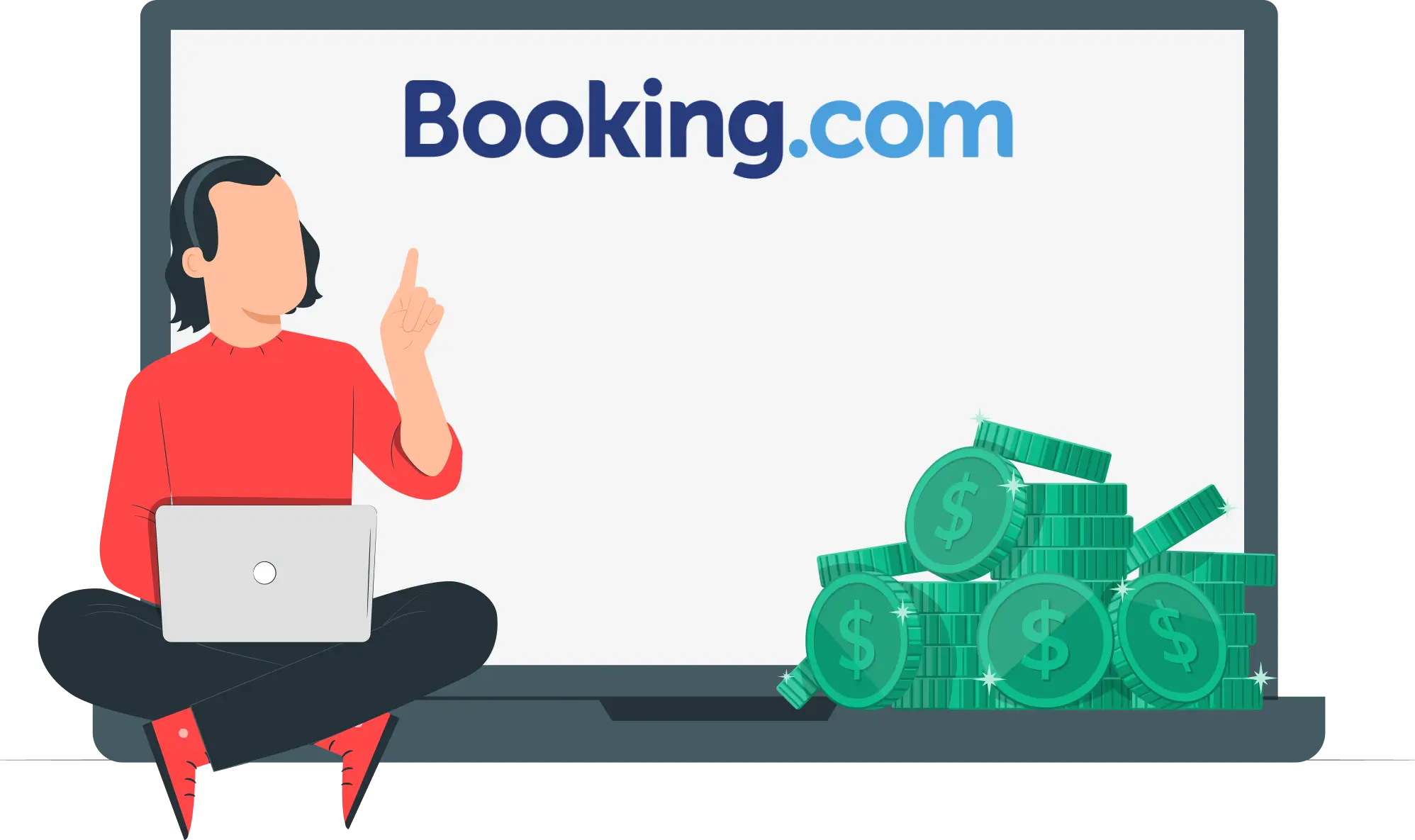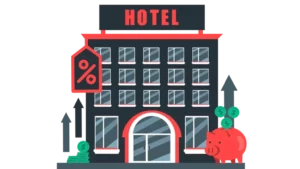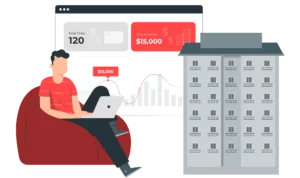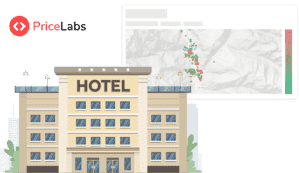Your hotel is fully booked for the weekend, thanks to a steady stream of reservations from Booking.com. However, the excitement of a packed house quickly fades when you see the booking.com fee deductions eating into your profits.
Many hoteliers find themselves in this situation, wondering if they’re losing more than they’re gaining. Partnering with Booking.com can skyrocket your property’s visibility and bookings. However, understanding its fee structure is critical to boosting your profits and keeping expenses in check.
Let’s dive into how Booking.com fees work so you can make informed decisions and optimize your listing’s performance.
Understanding Booking.com Fees
Booking.com operates on a commission-based model, where hotels and hosts are charged fees for every booking made through the platform. This means that while guests book without additional costs, the burden of fees falls on you, the property owner.


Typically, the commission fee ranges between 10% and 25% of the total booking value, averaging around 15%. This percentage is deducted from the amount you receive after a booking is completed.
Remember: this commission applies to the room rate and any additional services you offer, such as breakfast, parking, or special packages.
Further, Booking.com bills commission fees monthly, with an invoice detailing the previous month’s expenses. You can easily view and download these invoices from Booking.com’s Pulse app.
Comparing Booking.com Fees With Other Platforms
Here’s a quick look at how Booking.com compares to Expedia, Airbnb, and Vrbo so you can see if its fee is competitive or on the high side.
| Difference | Booking.com | Airbnb | Expedia | Vrbo |
| Fee structure | Commission-based model | Split fee or host-only fee | Commission-based model | Pay-per-booking |
| Fee range | 10% to 25% | Split fee: 3% (host), 13% -20% (guests) Host-only fee: 14% to 16% | 10% to 30% | 8% per booking (3% payment processing fee and a 5% commission fee) |
| Billing cycle | Monthly invoices | Split fee: Host: deducted every 24 hours; Guest: upfront Host-only fee: Deducted from the host payout | Monthly invoices | Deducted from the host payout |
Impact of Booking.com Fees on Hosts
So, how do these fees affect your earnings as a host? Let’s find out:
Reduced profit margins
Short-term rental hosts already juggle slim profit margins with utilities, cleaning services, and property maintenance costs. So when Booking.com takes a hefty commission, it seriously squeezes your bottom line.
For example, if you charge $150 per night and Booking.com takes a 15% fee, you’re left with $127.50. That’s $22.50 less per booking straight off the top. Over time, those fees add up.
Pricing strategy adjustments
You might need to adjust your nightly rates to cover the commission fees. This means increasing your rates to offset costs but can also affect your competitiveness and booking volume.
For example, if your hotel room is listed at $150 per night, Booking.com’s 15% cut leaves you with just $127.50. To keep your earnings steady, you might need to increase your rate to $175. This still costs around $150, but now your rate is higher than nearby listings, which could reduce your booking frequency.


Factors Influencing Commission Rates
Are you curious about why your commission rates might vary? Here’s the lowdown on what influences those numbers:
1. Location: If your property is in a popular spot—think bustling cities or tourist hotspots—expect higher commission rates because of the high demand.
2. Property type: Different properties, from boutique hotels to vacation rentals, have different commission rates. Luxury hotels charge higher fees than budget accommodations.
3. Booking channels: How guests book rooms can impact your commission. For instance, direct bookings on Booking.com are cheaper, while those made through partner sites or affiliates might cost more.
4. Participation in programs: Joining Booking.com’s Preferred Partner Program or Genius Program can boost your visibility, but be ready to pay higher commission fees.
5. Property performance: Top-notch reviews, high satisfaction ratings, and consistent bookings can help you negotiate lower commission rates.
6. Local taxes and regulations: Local taxes are usually added to the guest’s bill but can still affect your total booking amount and, in turn, your commission fee to Booking.com.
Strategies to Minimize Booking.com Fees
Many hoteliers struggle to make sense of the costs and wonder if they’re getting their money’s worth. Follow these tactics to cut down your Booking.com fees:
1. Incentivize direct bookings
Promote your property’s website to encourage direct bookings and avoid commission fees. Use social media, email newsletters, and even on-property signage to remind guests to book through your site.
Special discounts, complimentary amenities, or room upgrades can make direct reservations more appealing than third-party sites. Additionally, make sure your website is user-friendly and visually appealing.
2. Leverage discounts and promotions
Use Booking.com’s discounts and promotional campaigns to boost your occupancy during slow periods. Offer special rates or deals to attract guests looking for bargains and fill up those empty rooms.
Also, consider running your promotions, such as offering a discount for extended stays or bundling perks like free breakfast or parking. The goal is to make your property stand out as the best deal in town.
3. Use Dynamic Pricing
Dynamic pricing automatically adjusts room rates based on demand, seasonality, and local events. Dynamic pricing helps you to make up for the booking.com fees during busier seasons when guests are willing to pay more for your hotel rooms. It will automatically raise your nightly rates during high seasons and lower your rates when the bookings slow down to maintain occupancy levels. This strategy can help you stay competitive, manage your earnings, and maximize your Booking.com listings.
How Pricelabs Can Help Offset Booking.com Fees?
PriceLabs offers advanced dynamic pricing and revenue management tools that help hotels optimize their rates to boost revenue and occupancy.
One of its key features is customer API, which establishes a direct connection between PriceLabs and a hotel’s website.
By linking PriceLabs directly with the website, hotels can manage bookings independently, reducing their reliance on OTAs like Booking.com. Further, the API instantly updates pricing and availability on the hotel’s website whenever you change PriceLabs. This minimizes overbooking and guarantees guests see the most accurate, up-to-date information.
Additionally, hotels gain greater control over their pricing strategy and distribution. They can implement their pricing decisions swiftly and effectively—without waiting for third-party platforms to reflect the changes.
Turning Booking.com Fees Into Opportunities
While Booking.com fees are given when using one of the top booking platforms, they also provide opportunities to increase profitability and visibility.
However, this fee can quickly erode your profits if not managed carefully. High commission rates can force you to raise prices, potentially making your property less competitive and impacting the guest experience. Over time, these costs add up, reducing your profit margins and leaving you with slimmer margins.
By understanding how Booking.com fees work and using innovative strategies, you can avoid those costs and boost your profits.
About PriceLabs
PriceLabs is a powerful revenue management and dynamic pricing platform for hospitality accommodations, including hotels, aparthotels, vacation rentals, RVs, and campgrounds.
It helps maximize revenue by recommending room rates based on internal occupancy, competitor pricing patterns, and overall market data from booking.com and other OTAs.
Users save valuable time with bulk actions and flexible automation rules. Integrating seamlessly with over 110+ Property Management Systems (PMSs) and significant platforms like Airbnb and Vrbo, PriceLabs helps users update their room prices across all their booking channels multiple times daily.
Since its founding in 2014, PriceLabs has grown to price over 400,000 units across 150+ countries. It is available in five languages, making it a globally trusted tool for maximizing revenue and efficiency in the hospitality industry.








